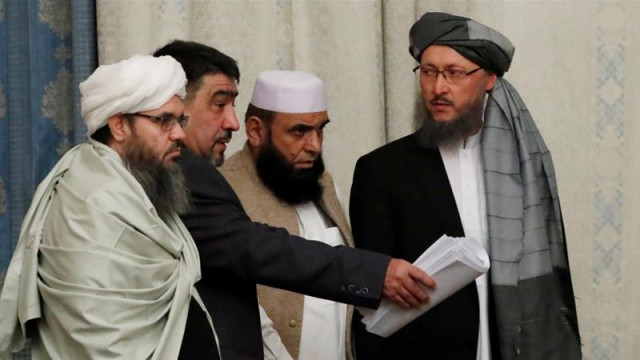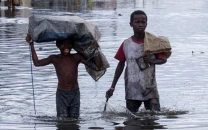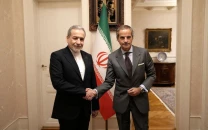Pakistan joins US-led call for Afghan ceasefire, talks
Four countries encouraged all parties to take steps to reduce violence, says joint statement issued by US

File photo of US-Taliban talks in Qatar. PHOTO: REUTERS
Pakistan joined the three powers in talks in Beijing. The four countries “encouraged all parties to take steps to reduce violence leading to a comprehensive and permanent ceasefire that starts with intra-Afghan negotiations,” said a joint statement issued by the United States.
They called for direct negotiations involving the Taliban, President Ashraf Ghani’s government and other Afghans to “produce a peace framework as soon as possible.”
Members of the Taliban and government met earlier this week in Qatar, a breakthrough even though participants were said to be there in a personal capacity. An Afghan campaigner who took part in breakthrough talks said she saw subtle improvements in the attitude towards women of the insurgents.
Afghan women note Taliban shift after Doha talks
Asila Wardak, a women's rights campaigner who works for the Afghan foreign ministry, said she was surprised at the positive atmosphere in Doha as women mingled directly with the Taliban over dinner and tea breaks. "It was interesting to me as an Afghan woman as they didn't shake hands but they warmly welcomed us," she told a symposium at Georgetown University on the peace process, speaking by video from Kabul.
Two Taliban delegates even showed flashes of humour, telling the Afghan women that they heard they would be coming and saying, "'Please don't give us a hard time,'" she said. "Maybe I'm wrong but their attitude has totally changed towards women, towards government employees," she said.
Ghizaal Haress, a constitutional scholar at the American University of Afghanistan, said it remained unclear what the Taliban were saying by signing the declaration in Doha. "The term 'Islamic regime' is very vague, it's very broad and there is a fear of what it will mean under the interpretation of the Taliban," she said.
"Do we mean an Islamic regime like the one in Malaysia or Indonesia? Do we mean an Islamic regime like Saudi Arabia or Iran? Or do we mean one like Pakistan?" she said, referring to governments with varying degrees of openness toward women.
Alice Wells, the acting assistant secretary of state for South and Central Asia, said that Afghanistan's future relationship with the United States will "depend heavily" on preserving the gains made by women. "No current or future Afghan government should count on international donor support if that government restricts, represses or relegates Afghan women to second-class status," she said.


















COMMENTS
Comments are moderated and generally will be posted if they are on-topic and not abusive.
For more information, please see our Comments FAQ